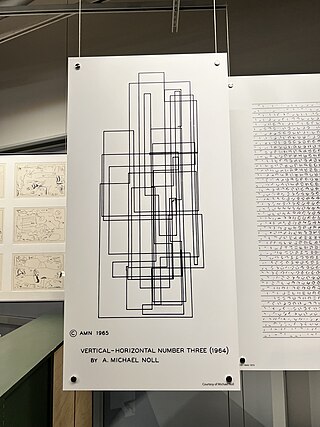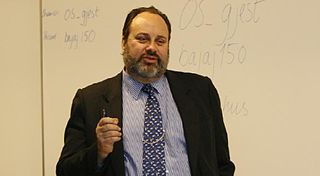Related Research Articles

Manuel Castells Oliván is a Spanish sociologist. He is well known for his authorship of a trilogy of works, entitled The Information Age: Economy, Society and Culture. He is a scholar of the information society, communication and globalization.
Everett M. "Ev" Rogers was an American communication theorist and sociologist, who originated the diffusion of innovations theory and introduced the term early adopter. He was distinguished professor emeritus in the department of communication and journalism at the University of New Mexico.

William H. Dutton is former Director of the Oxford Internet Institute, Professor of Internet Studies, University of Oxford, and Fellow of Balliol College. He also has a chair in Michigan State University's Department of Media and Information, where he is Quello Professor of Media and Information Policy. He was previously a Professor in the Annenberg School for Communication at the University of Southern California, which he joined in 1980, where he was elected President of the Faculty.

George Gerbner was a professor of communication and the founder of cultivation theory. He taught at Temple University, Villanova University, and the University of Pennsylvania.

The Annenberg School for Communication is the communication school at the University of Pennsylvania. The school was established in 1958 by Wharton School alum Walter Annenberg as the Annenberg School of Communications. The name was changed to its current title in 1990.

A. Michael Noll is an American engineer, and professor emeritus at the Annenberg School for Communication and Journalism at the University of Southern California. He served as dean of the Annenberg School from 1992 to 1994. He was a very early pioneer in digital computer art and 3D animation and tactile communication.
Dallas Walker Smythe was a political activist and researcher who contributed to a political economy of communications. He believed that research should be used to develop knowledge that could be applied to policies in support of public interest and the disenfranchised in the face of private capital. He focused his research on mass media and telecommunications. Some of his main ideas included the "invisible triangle", and the "audience commodity". Much of his effort was focused on differentiating between Administrative and Critical Communications research.

Robert Georges Picard is an American writer and scholar in the field of media businesses and media policy economics. He heavily influenced media economics studies.
In the social sciences, framing comprises a set of concepts and theoretical perspectives on how individuals, groups, and societies organize, perceive, and communicate about reality. Framing can manifest in thought or interpersonal communication. Frames in thought consist of the mental representations, interpretations, and simplifications of reality. Frames in communication consist of the communication of frames between different actors. Framing is a key component of sociology, the study of social interaction among humans. Framing is an integral part of conveying and processing data daily. Successful framing techniques can be used to reduce the ambiguity of intangible topics by contextualizing the information in such a way that recipients can connect to what they already know.
D. Lawrence Kincaid is an American communication researcher who originated the convergence theory of communication. He was a senior advisor for the Research and Evaluation Division of the Center for Communication Programs and an associate scientist in the Faculty of Social and Behavioral Sciences at the Johns Hopkins Bloomberg School of Public Health.
Ablex Publishing Corporation is a privately held publisher of books and academic journals in New York City, New York, USA. It was previously located in Norwood, New Jersey, and also at one time in Westport and Stamford, Connecticut. Ablex publishes edited volumes, monographs, research journals, and textbooks, focused on communication, education, library science, psychology, and technology. In 1997, Ablex became an affiliate company of JAI Press, a subsidiary of Elsevier Science, the world's largest publisher of medical and scientific literature.
Joseph Woelfel is an American sociologist. Born in Buffalo, New York, Dr. Woelfel is an Emeritus Professor in the Department of Communication at the University at Buffalo, The State University of New York.
Karen Ashcraft is an American communication scholar and professor at the University of Colorado at Boulder. Her area of research is in social justice and organizational studies. She looks at identity in the workplace and organizational structures. Specifically she studies issues of diversity, hybrid organizations, gender and power. Being an organizational communication scholar, she sees discourse as central to understanding our human condition as well as how communication amounts to organizing. She examines discourse through a lens of a feminist communicology model to look at the critical role that communication has in one's identity creation.

Robert A. Hackett is a Canadian university professor and researcher. He has been a professor and researcher at the School of Communication in Simon Fraser University, Vancouver, British Columbia, Canada since 1984. His main areas of research include media activism, political communication and news analysis. Since 1993, he has co-directed NewsWatch Canada, a news media monitoring project based at Simon Fraser University.
Stewart Mark Hoover is a Professor of Media Studies and Professor Adjoint of Religious Studies at the University of Colorado at Boulder. He is the founder and director of the Center for Media, Religion and Culture. His research interest centers on media audience and reception studies rooted in cultural studies, anthropology and qualitative sociology. He is known for his work on media and religion, particularly in the phenomenon of televangelism, and later in religion journalism. His most recent work involves household-level studies of media audience practices of meaning-making and identity. Supported by a series of grants from the Lilly Endowment and the Ford Foundation, this work investigates the extent to which the media sphere as a whole and the various media which comprise it constitute a central site of meaning practice in contemporary domestic and global life. Through the center he directs, he has also become influential in scholarly discourses about the public understanding and role of religion globally and the ways those are rooted in its mediation.
Information policy is the set of all public laws, regulations and policies that encourage, discourage, or regulate the creation, use, storage, access, and communication and dissemination of information. It thus encompasses any other decision-making practice with society-wide constitutive efforts that involve the flow of information and how it is processed.

Alton L. (Pete) Becker was an American linguist known for his studies of Burmese grammar and other Southeast Asian languages, including Malaysian, Javanese and Kawi. He was a professor of linguistics at the University of Michigan from 1968 to 1986. Becker published studies in philology, rhetoric, and the ethnography of communication. He was coauthor with Richard E. Young and Kenneth L. Pike of the widely influential college writing textbook, Rhetoric: Discovery and Change, which introduced a Rogerian framework for communication and rhetoric studies as an alternative to the Aristotelian approach. To recognize his significant contributions and publications of translations from Southeast Asian languages to English, the Association for Asian Studies awards the annual A. L. Becker Prize to honor his significant contributions.
Ronald L. Jackson II is an American academic and author. He is Past President of the National Communication Association and a professor of communication, culture, and media, and a former dean of the McMicken College of Arts and Sciences at the University of Cincinnati.
John L. Jackson Jr. is an American anthropologist, filmmaker, author, and university administrator. He is currently the Provost and the Richard Perry University Professor at the University of Pennsylvania and was previously Dean of the School of Social Policy & Practice and Special Adviser to the Provost on Diversity at Penn. Jackson earned his BA from Howard University and his PhD in anthropology from Columbia University. He served as a junior fellow at the Harvard University Society of Fellows before joining the Cultural Anthropology faculty at Duke University.
Anita Taylor is professor emerita of communication and a member of the gender and women studies faculty at George Mason University. Taylor was born in Kansas during the Dust Bowl and went on to become very active in research focusing on women in education.
References
- ↑ Surveillance Studies Network. "Awards & Prizes". Surveillance Studies Network. Retrieved May 11, 2021.